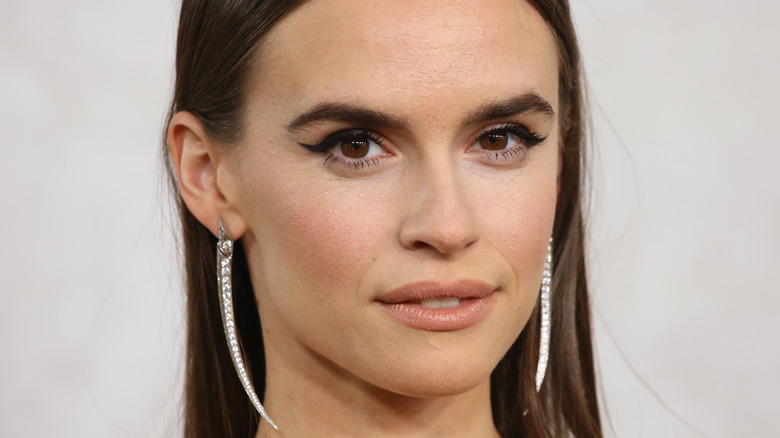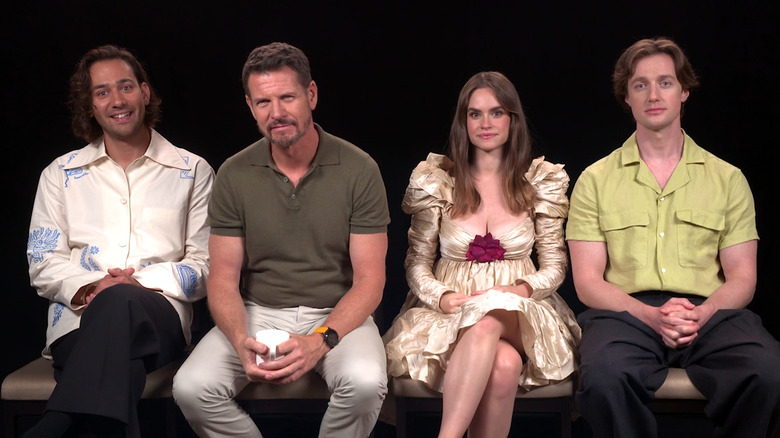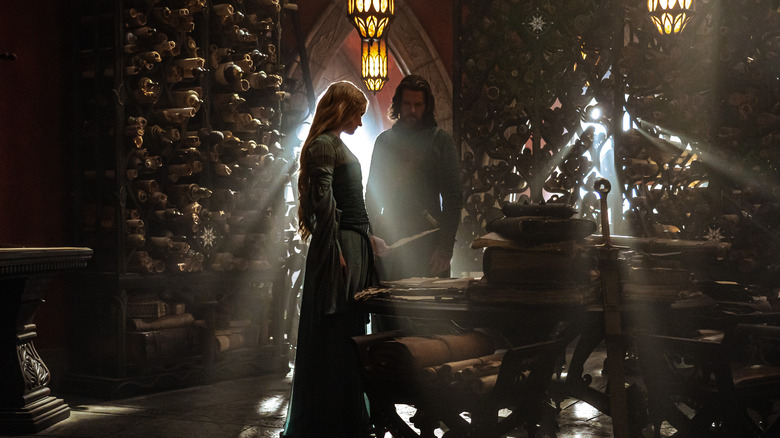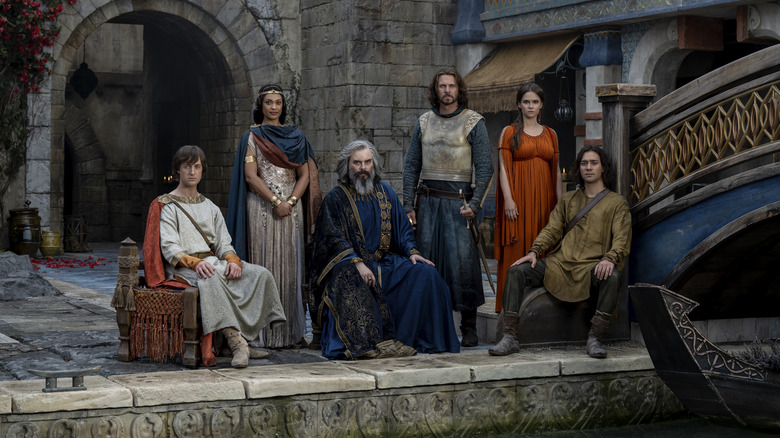The Rings Of Power's Númenórean Cast Talks National Pride And Family Grief - Exclusive Interview
The island nation of Númenor is an important part of Tolkien's mythos. Even though its influence extends through the Third Age that follows, the primary history of that island people takes place during the Second Age, when the story of "The Lord of the Rings: The Rings of Power" is set. In Prime Video's adaptation, the people of Númenor enter the narrative during Episode 3 of Season 1, in which viewers are given a rapid-fire introduction to the island, its capital city, and its leaders.
We also meet an essential offshoot of the royal family, led by the patriarch Elendil. In the on-screen version of the story, the iconic hero from Tolkien's legendarium is a widower who is trying to manage his grieving family. This includes his sons, Anárion (who's off-screen) and Isildur, as well as his daughter, Eärien (who has been created for the show).
We recently had a chance to sit down with actors Lloyd Owen, Maxim Baldry, and Ema Horvath (who portray Elendil, Isildur, and Eärien, respectively), along with Leon Wadham, who plays another newly minted character, the Númenórean royal Kemen, son of the infamous Pharazôn. In our conversation, we tackled several key questions that the cast faced as they worked to bring Númenórean Middle-earth to life on screen. From struggles between the Elf-loving "Faithful" and the anti-Elven "King's Men" to digging into Elendil's grief, his potential penchant as a scholar, and more, here is our interview with several of the rambunctious Númenórean cast members of "The Rings of Power."
Númenóreans are the greatest — never forget it
We've got most of the Númenórian crew back together again. Lloyd, last time you started the interview by saying, and I quote, "Númenórians are the greatest. Never forget it, whoever else you meet."
Lloyd Owen: The truth is the truth, and it's unimpeachable as far as I'm concerned.
Ema, do you echo your on-screen father's sentiment?
Ema Horvath: Yes, I would agree strongly with that. We are the greatest.
How do we see that Númenórian pride reflected in your character, the new one on the screen?
Horvath: Númenórians have started to develop their own architectural style. Older buildings are in the old Elvish style. They've created their own alphabet and language, Adûnaic. She writes in Adûnaic, and she designs buildings that are in this new style that they've created.
So that reflects that Númenórian pride, right? Separating from the old ways, the tradition?
Horvath: Yes.
Will Elendil eventually write down the history of his people's fall?
Lloyd, you play Elendil, a famous leader, [a] king, a warrior, but "Unfinished Tales" talks about your character preserving some of the tales of Númenor, and even that you may have written the Akallabêth, "the Downfall of Númenor." We saw a picture already of you with Morfydd [Clark, who plays Galadriel,] in a library. Will we be seeing the scholarly side of your character in the show?
Owen: That's a very good question, actually. What's interesting about how J.D. [Payne] and Patrick [McKay] have set Elendil up is that with this being a widow, having lost his wife, having to try and bring up these grieving adult children, part of the effect of that is that there's a rejection in him of the Faithful ways. Ultimately, in death, if you're Faithful, there is some sort of celebration because they consider that to be the gift of Ilúvatar. There's a gift in death, so in those funeral rites, there's a positivity. I think because of his pain, he wants to reject that idea because he doesn't feel anything positive has come out of that experience. And that's part of his move [of] bringing the family into the capital city. His pragmatic head is trying to start a simple new life. His heart is in pain, but trying to ... His head is rejecting that, and his heart is still connected to the Faithful.
So when he meets Galadriel, that is something. Through that relationship in the Hall of Lore, she begins to reawaken that side of his personality. It's almost like, instinctively, he can't deny the draw to her, probably because of his Elvish blood. Because of Elros and his connection way back there in the family tree, there's a gradual burgeoning of his conscious understanding and his conscious connection coming alive.
It's interesting, what's written about him potentially having written the Akallabêth. Perhaps that writing will come later, by the time he's got to Middle-earth and much has happened to him. Perhaps that scholarly nature, or even if it's just a diary of his experiences, have shaped him so greatly. Perhaps the need for legacy to put that down for coming generations was a real ... It's probably from the grief of the loss of Númenor, [which is] spoken about a lot [among] those early settlers of Middle-earth — how much [they're] longing for that island and what they've lost. Perhaps that was part of the motivation for writing that down for him, so that some of that essence could be felt. It's certainly felt in Aragorn and all the way down that family tree.
The struggle (and joy) of bringing epic stories down to Earth
Most of Tolkien's Second Age writings are very light on details. Maxim, we meet your character in the books when he is already doing the heroic stuff. Leon, your character is invented for the show, so there's a lot of gaps here, but you're closely connected to Pharazôn, your father. In spite of the big expectations, you've both talked about how neither of your characters are in the spotlight yet during the 1st season. Instead, you're young royal family members trying to find your place in the world. Can you explain what it's been like to explore these smaller details in a story as big as the Atlantian Downfall of Númenor?
Leon Wadham: I've loved it. There's something really fun for me. I don't know how audiences will take it, but you meet so many characters who've been through so much for some millennia of difficulty. Then you meet this person who is young, has everything, and feels invincible. I think it's hysterical that you meet this guy who's had everything, has only ever known Númenor in a golden age, and has no interest in anything changing because it's always served him so well. He's a really interesting counterpoint to so many other characters, not only in Númenor but [throughout] the show. I can see him either being really refreshing or infuriating.
Maxim Baldry: I think starting small is a gift for a character [whom] you know where he ends up and who he becomes. Being able to distill all of his pain into this storyline, which is about finding himself and understanding who he is and what he wants, and then, as an audience member, growing with him and his ideas as they get bigger. I don't think his world is as big as it is towards the end. His world is quite small. That's why it's quite nice playing that storyline, and then hopefully evolving and growing with him.
"The Lord of the Rings: The Rings of Power" is airing in weekly installments every Friday at 12 a.m. ET for the remainder of its eight episodes of Season 1.
This interview has been edited for clarity.



